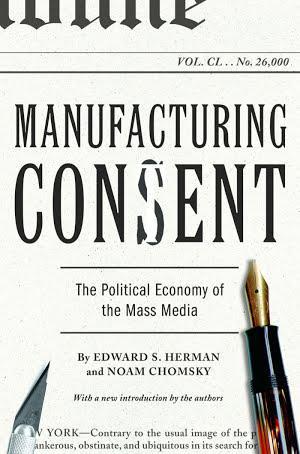vxnxnt reviewed Manufacturing Consent by Noam Chomsky
An essential read for anyone looking to challenge the current hegemonic common sense
5 stars
I found this to be quite an interesting read which, although published in 1988, is still fairly relevant and now has helped me gain a new perspective on the inner workings of the mass media and the political economy encompassing it.
In the first chapter, Herman and Chomsky describe the political economy and derive their "propaganda model" from it. This propaganda model has "five filters" as follows: 1. Size, ownership, and profit orientation; 2. The advertising license to do business; 3. Sourcing mass media news; 4. Flak and the enforcers; 5. Anti-communism as a control mechanism. All of these aspects come together as filters for a system of self-censorship and deceit, whether conscious or unconsciously, directed towards the population to sustain the prevalent narrative of the U.S. government and the elite class.
The following six chapters are case studies in which the authors take a look at various topics, how …
I found this to be quite an interesting read which, although published in 1988, is still fairly relevant and now has helped me gain a new perspective on the inner workings of the mass media and the political economy encompassing it.
In the first chapter, Herman and Chomsky describe the political economy and derive their "propaganda model" from it. This propaganda model has "five filters" as follows: 1. Size, ownership, and profit orientation; 2. The advertising license to do business; 3. Sourcing mass media news; 4. Flak and the enforcers; 5. Anti-communism as a control mechanism. All of these aspects come together as filters for a system of self-censorship and deceit, whether conscious or unconsciously, directed towards the population to sustain the prevalent narrative of the U.S. government and the elite class.
The following six chapters are case studies in which the authors take a look at various topics, how they were reported by the mass media and what happened in reality. These studies includes comparisons between the regimes and elections in El salvador/Guatemala and Nicaragua, the supposed plot to kill the pope and the war in Vietnam.
In each of these examples it becomes clear that the mass media closely adheres to the government's narrative, elite consensus and the exclusion of dissident opinion. Additionally, a dichotomy reveals itself in which the media unneedingly villianizes the enemies of the state whilst blatantly defending repressive dictatorships backed by the U.S. . While Herman and Chomsky analyze various news articles and TV broadcasts covering the topics, they also dive into many extensive statistics, backing their thesis.
Moreover, the book is also quite the valuable repository of history. It covers the dictatorships and elections of El salvador and Guatemala and U.S. atrocities and war crimes committed in Indochina. Particularly, the invasion of Vietnam and the bombing of Laos and Cambodia, which I knew only very little about until now.
After reading Manufacturing Consent, I often came to notice fragments of this progaganda model myself. I can't help but think of the relevancy found in the media concerning the war in Ukraine. When a missle first landed in Poland, the media was quick on their feet to report that it was a russian attack, according to "government officials". A few days later it was quickly established that it was most likely a Ukrainian missle that had malfunctioned, however. Furthermore, when Russia first invaded and it was extensively reported on, many people were quick to call it systematic racism. This was because other wars and tragedies from the global south were not being reported on. Instead I now believe that Herman's and Chomsky's propaganda model provides a much better answer as to why these tragedies aren't being reported on. Part of it is the difference between "worthy" and "unworthy" victims. That is, the mass media claims the victims of the global north as worthy since they fit best into the picture of the government's foreign policy and serve elite interest. All the while, the victims of the global south are deemed unworthy since they are either harmful to the manufacturing of consent to be governed or they outright have no use in the business model of the media.
Even so, although the given case studies and examples were necessary to convince the reader and to back their thesis, they were quite detailed and extensive. Of course details and vast amounts of information are important to make their case and to have the reader get a proper picture of the individial topics, however it also led to the problem of having the book become a bit boring after a while. Aside from that, the language used was also a bit difficult at times with some complex sentence structures and unique choice of words.
Finally, I very highly recommend this book to anyone as it brings forth an immensely important topic of how our beloved "free" and "independent" media is anything but that. Manufacturing Consent will have you thinking critically when looking at any sort of media by the end of it.


